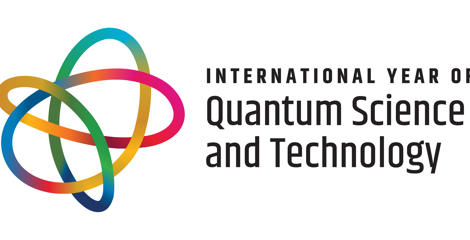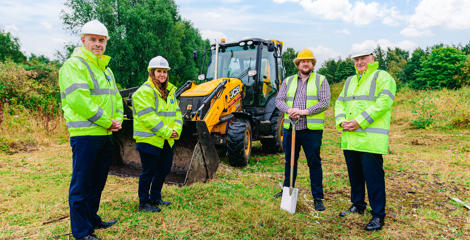New UK Quantum Hub launches to pioneer secure networks and advance the quantum internet

The Integrated Quantum Networks Hub will address the challenges underpinning the establishment of a “quantum internet”, by developing the novel technologies, protocols and industry standards necessary for the deployment of a secure, scalable, quantum communications infrastructure for the UK and beyond.
Led by Heriot-Watt University and supported by over £42M of EPSRC funding and industry contributions, the new Hub brings together the expertise of a further 12 leading UK universities (Bristol, Cambridge, Glasgow, Edinburgh, Imperial, Oxford, Queen’s Belfast, Sheffield, Southampton, Strathclyde, Warwick and York), two national laboratories – the National Physical Laboratory and STFC RAL Space – and over 40 industrial partners to secure the UK’s leadership in quantum secure communications.
The project was formally launched yesterday in Edinburgh at an event attended by over 120 researchers, industry stakeholders, and government representatives. This included senior figures from the Department for Science Innovation and Technology (DSIT), UKRI, GCHQ, the National Cyber Security Centre (NCSC), the Defence Science and Technology Laboratory (Dstl), Technology Scotland, the National Quantum Computing Centre (NQCC), as well as key figures from the UK National Quantum Technologies Programme.
Quantum networks enable the transmission and sharing of quantum information by harnessing entanglement and quantum measurement—capabilities that go beyond what classical systems can achieve. The Integrated Quantum Networks (IQN) Hub is working to realise scalable, practical quantum networks, from local links between quantum processors to national entanglement infrastructure and intercontinental satellite-based communications. This pioneering research opens up transformative possibilities in quantum-secure communications, distributed quantum computing, and ultra-sensitive quantum sensor networks. The hub’s vision aligns with the UK Government’s national quantum strategy, which sets out an ambitious goal: by 2035, the UK will have deployed the world’s most advanced quantum network infrastructure.
Kickstarting the proceedings, Tom Newby, Head of DSIT’s Office for Quantum, talked about the opportunities afforded by quantum technologies for the UK’s evolving industry landscape, the development of supporting skillsets and the potential for economic boost through leading innovation and commercialisation activities.
Secretary of State for Science and Technology, Peter Kyle said:
“Supporting the deployment of technology that emerges from the Quantum Research Hubs will mean faster diagnoses for diseases, critical infrastructure safe from hostile threats and cleaner energy, all of which are key to our Plan for Change.
“By pooling expertise from across the UK to capitalise on quantum technology, we can transform sectors like healthcare and security to improve lives and create a culture of accelerated innovation that helps to grow our economy.”
The event featured a series of expert talks and panel discussions with industry partners, spotlighting the Hub’s vision to develop and commercialise next-generation quantum communication technologies. Highlights included advances in quantum memories, new network designs that integrate with today’s fibre-optic infrastructure, and satellite-enabled quantum communication—already being demonstrated through SPOQC, one of the UK’s flagship quantum space missions. To support the growing quantum ecosystem, researchers are also working on essential technologies like quantum light sources, detectors and switches, while contributing to the development of future security standards that will help shape the industry as it scales.
The Integrated Quantum Networks Hub is building on the UK’s enormous strengths in quantum research and combines our world-class academic base with leading industry partners from across the telecommunications, space, security and quantum technology sectors. We have a hugely ambitious vision to establish UK leadership in quantum networking however, through this Hub, we have assembled an extraordinary partnership to help deliver this.
Andrew Lord, Head of Optical Network Research at BT, a key industry partners of the project, said:
“BT is thrilled that this crucial quantum networks hub has been launched and we look forward to being involved with it. Quantum networks go far beyond Quantum Key Distribution and we are excited to see research leading towards the ultimate promise of quantum connections between quantum computers.”
Professor Gillian Murray, Deputy Principal for Business and Enterprise, Heriot-Watt University added:
“Collaboration sits at the heart of everything we do at Heriot-Watt. By working closely with industry, government, and research partners through initiatives like the Integrated Quantum Networks Hub, we’re helping to shape the innovation clusters of the future—ones that will drive economic growth, deliver secure technologies, and position the UK as a global leader in quantum innovation. These partnerships are critical to developing future talent, unlocking new capabilities and translating world-class research into real-world impact.”
The IQN Hub is part of a network of five quantum technology hubs, launched by UKRI Engineering and Physical Sciences Research Council (EPSRC), with a £106 million investment from EPSRC, the UKRI Biotechnology and Biological Sciences Research Council (BBSRC), UKRI Medical Research Council (MRC), and the National Institute for Health and Care Research (NIHR).
To find out more, visit iqnhub.org
Heriot-Watt University: Shaping the Future of Quantum Sciences and Photonics
Throughout the UNESCO International Year of Quantum Science and Technology 2025, Heriot-Watt University is proud to showcase its world-leading research and innovation in quantum sciences and photonics. Ranked #1 in the UK for physics research in the Research Excellence Framework (REF 2021), with 94% of our research rated as world-leading or internationally excellent, our interdisciplinary approach, strengthened by external partnerships, continues to advance scientific understanding and deliver real-world impact across sectors such as telecommunications, healthcare, and precision manufacturing.
Contact
Scott Holmes
Related content
Heriot-Watt to lead UK's push for ‘near-unhackable’ quantum internet
Heriot-Watt University announces its leadership of a new quantum research hub that aims to develop the ultra-secure 'quantum internet' of the future.

European quantum light tour to be hosted at Scotland’s Heriot-Watt University
A quantum light source that’s travelling across 12 countries in Europe with UNESCO is being hosted at Heriot-Watt University in Edinburgh, its only Scottish stop on the tour.

Physicists propose new approach that could unlock barriers to global scale quantum network
Physicists at Heriot-Watt have published research that could unlock barriers to a global-scale quantum network

Heriot-Watt secures three awards to drive innovation in Scotland’s photonics sector
Heriot-Watt University has three funded projects in the first round of awards from the inaugural Photonics and Quantum Accelerator (PQA).

Heriot-Watt University breaks ground on new £2.5M Optical Ground Station
Work has started on a new Quantum Communications Hub Optical Ground Station (HOGS), a state-of-the-art telescope which is being built on Heriot-Watt University’s Research Park.